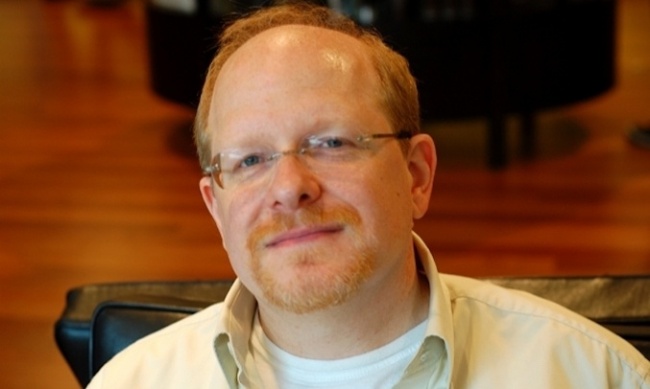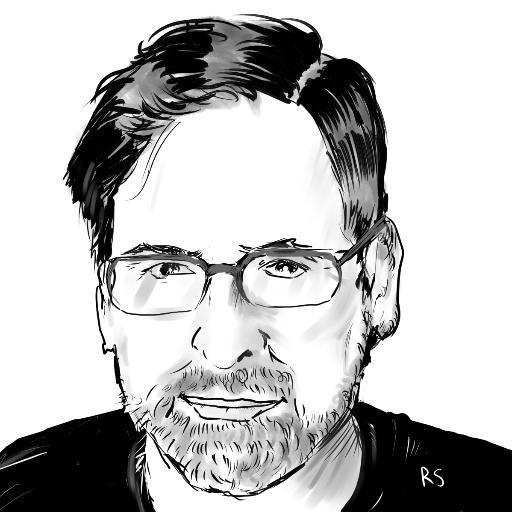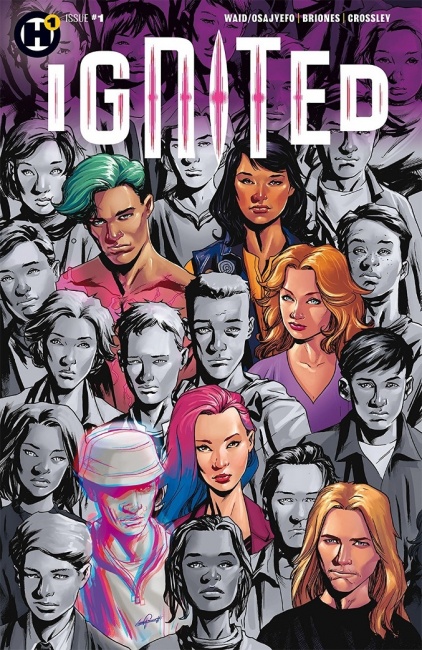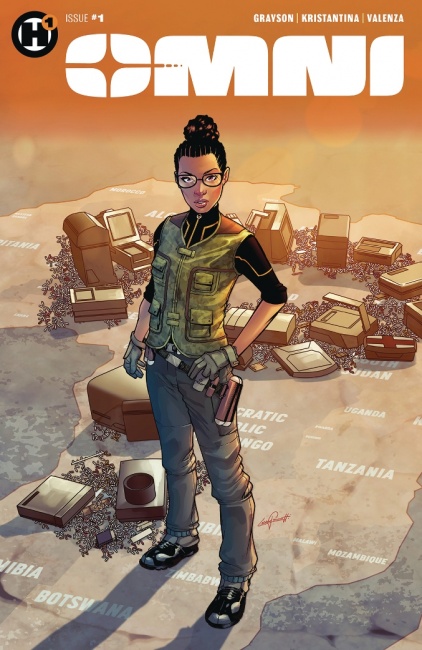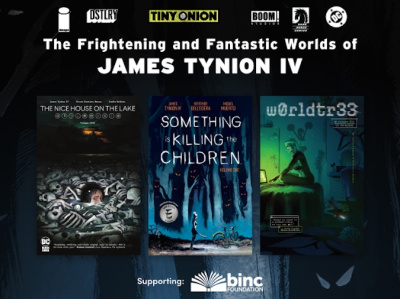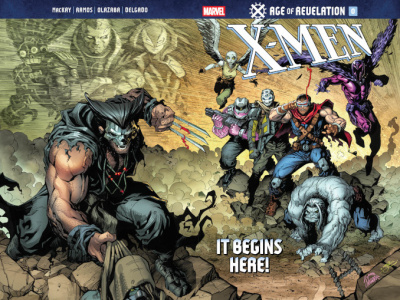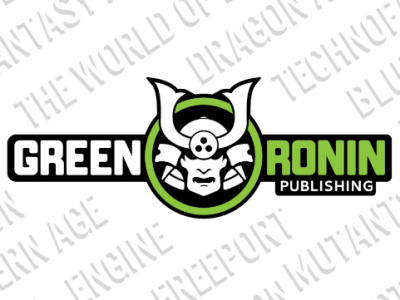Waid, who has held creative and editorial positions at many publishers in his 35-year career, is clearly on speed-dial if you’re looking for someone to put together a solid connected-story universe in a superhero or superhero-adjacent genre. I had a chance to talk with him about what’s going on at Humanoids, the creative and market strategy, and the role of continuity-based comics in today’s evolving direct market. Our conversation has been edited for length and clarity.
Rob Salkowitz, ICV2: So Mark, how did you get involved with Humanoids?
Mark Waid, Director of Creative Development, Humanoids: I was drawn in by my good friend Jud Meyers, who had just been hired as their head of marketing and sales. They already had a plan sketched out and were looking for someone to write Ignited. I said I’d only do it with a co-writer to give me a fresh perspective, and they thought that sounded good. I had lunch with [CEO and Publisher] Fabrice Giger a few times and it was clear there was more we could do together. That’s when I came aboard as Director of Creative Development.
RS: Is that a staff position?
MW: No, but I give them a few days a week and I’m on call to put out fires.
RS: Tell me about some of the H1 books.
MW: In a nutshell, Ignited [written by Waid and Kwanza Osajefeyo, with art by Phil Briones] explores what would happen if the Marjorie Stoneman Douglas [shool shooting] kids had superpowers and could fight back against the conditions that make those things all too frequent.
RS: That’s unfortunately topical.
MW: That’s part of what we’re going for. It’s not a superhero story as much as it’s about empowerment, about what people can do to change their world.
Strange Lands [written by Magdalene Visaggio & Darcie Little Badger with art by Guillermo Sanna] is about two strangers who discover they have super powers, but can only use them if they are a certain physical distance from each other. They’re travelling the world to try to find out what’s happened to them. It’s an adventure story with romantic comedy overtones.
Omni [written by Devin Grayson, art by Alitha Martinez] is about an African-American woman doctor, Cecilia Cobbina, who becomes empowered with a kind of super intelligence – not just the ability to reason and calculate, but all forms of intelligence, including strategic thinking, visual and verbal intelligence, emotional intelligence. She’s also travelling the world trying to figure out what’s going on.
RS: So this is a connected world, with a story that’s going to come together at some point?
MW: Right. You don’t need to read all the books to know what’s going on, but they are part of a cohesive narrative that we’ll pull together at the end of the year.
RS: Humanoids has been present in the US market for decades, mostly as an importer of European material. Now it looks like they’re making a much broader push into North America. Where does what you’re doing fit in the overall plan?
MW: It’s a part of what they’re doing. My role in the H1 books is a consultancy as much as anything else. The bigger picture is bringing in new projects from new writers with a fresh perspective, and original graphic novel material that no one else is doing. Western, Sci-Fi, fantasy, biography, nonfiction… anything but costumed superheroes. It’s not just the small focus on a contained universe (which is great – but the broader spectrum of working in a form of the medium that’s fairly new to me. I’m here to help people tell their stories the best way possible in our medium.
RS: These books look like they are mostly aimed at the Direct Market audience, is that fair?
MW: Right.
RS: Frankly, why does Humanoids care about the U.S. market, particularly the direct market, at this point?
MW: I think they like what they’re seeing about our changing market and changing audience, with more appetite for different kinds of content. It’s part of an all-out effort to enter the American market, not just DM but also bookstores. They see the way we’re trending as a business, away from floppy monthly comics toward longer self-contained material. They’ve been doing that successfully for 40 years overseas, so why not have more footprint here?
RS: The DM has seen a few publishers launch in the last 18-24 months with versions of this same approach: established veteran creators, high production value, a mature, updated take on the broadly-conceived superhero-action-science fiction genre. How do you plan to stand out from the crowd?
MW: It’s a good question, because there are definitely more players in that space. The H1 books are topical, designed to be dangerous. One of the advantages of working with a global publisher, we can hit subjects that other companies, especially corporate companies, can’t do.
From a business standpoint, we’re thinking locally but acting globally. The floppies are aimed at the American direct market, but the GNs are co-printed in France and distributed in Europe. Stuff like Ignited will be released as trades in the US and as albums in the BD format in Europe.
RS: Ah, so Humanoids’ advantage here is their access to that European market, where they’re already a recognized, established player.
MW: Exactly. That means we can go for sales in the US direct market, but we don’t have to live and die with that because there’s a bigger audience for the trades waiting worldwide.
RS: Are any of the H1 books creator-owned?
MW: No, but creators get a piece.
RS: So they are using the American rather than the European IP model?
MW: In this case, yes.
RS: I’m sure you hate this question, but I have to ask, is this laying the groundwork for a bigger media strategy?
MW: Not specifically. The honest truth is, no one started thinking about selling to TV. We’re trying to create material specially for our medium. If someone’s interested, we’ll have the conversation. It’s foolish not to think of it, but no one is starting with that.
RS: Since you’re working in a connected universe here, I want to take a moment for a broader question. The DC and Marvel material that our generation came up reading in the 1970s and 80s used continuity to really expand and deepen the appeal of those characters, and it made a lot of us fans, if not for life, then definitely into adulthood. Do you think those techniques of world-building are still as effective in getting readers in and keeping them?
MW: Absolutely not. With each new generation, it loses more of its appeal. It was easy to dive in and out of when you were paying 25 cents for a comic. It really broke down in the early 90s, when Marvel started publishing too many books for any fan to buy all of them. It shattered the illusion that you could get into and out of that. When you add in that since we’re a binging society, reading in TPB form, the continuity isn’t really a selling point anymore.
RS: What do you think the industry, and specifically the part of the industry publishing continuity-oriented genre books, either superhero or what have you, can do better to grow the market and get new fans coming into the comic store week by week, month by month?
MW: I think making the material legitimately timely. In the case of Ignited, that’s being sadly topical. The material that draws people in will reflect their own lives, especially as the audience becomes more inclusive.
RS: Finally, you’ve done a lot of work for a lot of publishers over the years. What excites you about this opportunity?
MW: Being able to work off genre. That to me is the appeal. It lets me bring my other storytelling skills to bear. It helps me rethink what I do as a storyteller.
The opinions expressed in this column are solely those of the writer, and do not necessarily reflect the views of the editorial staff of ICv2.com.
Rob Salkowitz (@robsalk) is the author of Comic-Con and the Business of Pop Culture.



